03 August 2006
Church-Free Zoning Rule Challenged in Federal Suit
 (cnsnews.com) A church-free zoning ordinance has touched off a legal fight in Titusville, Pa., with city officials relying on a 1976 regulation...
(cnsnews.com) A church-free zoning ordinance has touched off a legal fight in Titusville, Pa., with city officials relying on a 1976 regulation...
to try to prevent the Lighthouse Christian Center from building a new church in the city's commercial district.
The conservative legal group Liberty Counsel has filed a federal lawsuit against Titusville on behalf of the church, alleging that the "church-free" zoning rule violates the Religious Land Use and Institutionalized Persons Act of 2000 (RLUIPA), which Congress passed and President Bill Clinton signed to protect religious freedom.
Tim Lorenz, a building inspector and zoning officer for the city of Titusville, cited the "Codified Ordinances of Titusville," specifically Article 1311.04, for deciding to reject the church's plans.
The section in question limits C-1 Commercial district permits to stores, restaurants, offices, theaters, gas stations, hotels, clubs and other nonreligious services. Churches are only permitted in residential areas of Titusville.
Mathew Staver, founder and chairman of Liberty Counsel, said the city blocked the Lighthouse Christian Center from locating in the commercial district, even though the church had already secured a lease in a building zoned for C-1.
He blamed Titusville officials for applying the 1976 ordinance without checking to see if it complied with the RLUIPA or the First Amendment to the U.S. Constitution, the latter of which states that "Congress shall make no law respecting an establishment of religion, or prohibiting the free exercise thereof."
Staver said the city's ruling also violates the Lighthouse Christian Center's rights under the Fourteenth Amendment to the Constitution, which declares that "No State shall make or enforce any law which shall abridge the privileges or immunities of citizens of the United States; nor shall any State deprive any person of life, liberty, or property."
"It's one thing to have a code that's just sitting there, but it's another thing to actually continually apply it, as in this particular case the city has done," said Staver.
The Lighthouse Christian Center is "in dire straits because this particular city ordinance has essentially removed them from the city limits and they can't use the property that was ideal for them," he added.
According to Liberty Counsel, the church was previously located in East Hickory, Pa., in a 1,400 square foot building that had no sewage or running water.
The new building leased by the Lighthouse Christian Center was intended to house worship meetings, food storage and distribution and as well as a Christian bookstore, teenager outreach program, and television ministry. Liberty Counsel stated that the facility was the "ideal location" for the Center because it is "located in the target population of the church's primary outreach to teenagers."
"They are now languishing in a rental property that lacks heat and insulation," Staver added. "Certainly that has to be remedied fairly quickly, because when we enter the winter months that could be essentially a component that would shut the operation down."
Lorenz said he was simply doing his job to enforce the law. "It is a pretty old ordinance, and what the people who are responsible for writing the ordinance had in mind back then, I have no idea," said Lorenz. "I am just enforcing it as it is written."
Staver said that when Congress passed the Religious Land Use and Institutionalized Persons Act of 2000 (RLUIPA), "it was incumbent upon all municipalities to revisit their zoning ordinances in relation to houses of worship."
RLUIPA states that "No government shall impose or implement a land use regulation in a manner that treats a religious assembly or institution on less than equal terms with a nonreligious assembly or institution."
Staver said many local zoning ordinances conflict with RLUIPA and such controversies have been frequently litigated since the federal law went into effect.
On July 26 a small Orthodox synagogue in Hollywood, Fla., was permitted to remain in its location after Judge Joan Lenard of the U.S. District Court for the Southern District of Florida ruled against the city's zoning ordinance.
On June 6 the New York Court of Appeals ruled that the town of Mount Pleasant, N.Y., could not use its zoning ordinance to prohibit a religious "conference and training center" run by the Legion of Christ in the same building as a secular "conference and training center" run previously by IBM.
Staver said there is "no question" that the U.S. District Court for the Western District of Pennsylvania, where he filed the lawsuit on behalf of the Lighthouse Christian Center, will decide to allow the church to move into Titusville's commercial district.
By Alison Espach
08:45 Posted in UNITED STATES | Permalink | Comments (0) | ![]() Facebook |
Facebook |



















The comments are closed.